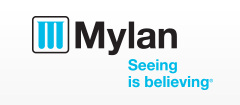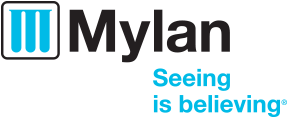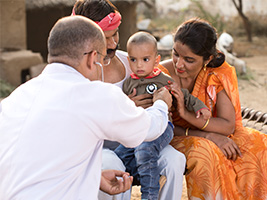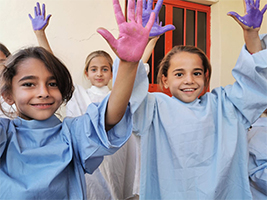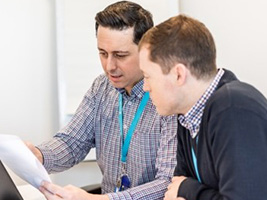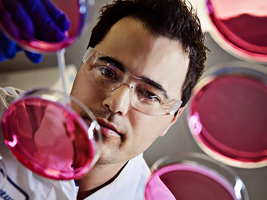Global social responsibility is intrinsically woven within Mylan’s commitment to achieve our mission and deliver better health for a better world. It is what drives our enduring passion to improve access and serve unmet needs across all geographies, while respecting the environment and positively impacting our stakeholders.

>7,500
Products Globally

>165
Countries and Territories Reached including ~90% of Low- and Lower-Middle-Income Countries

18 cents
Average Price
per Dose
~40%
of the ~23.3M HIV+ patients depend on one of our products1
~60%
of the world’s HIV+ children on treatment depend on one of our products

40+
Manufacturing
Facilities

~35,000
Global Workforce
Our mission of access informs everything we do, and we understand the important role we play in giving everyone the opportunity to live the healthiest life possible.

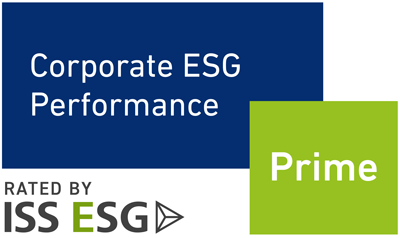
-
How is Mylan Providing Access to High Quality Medicine in Low- and Lower-Middle-Income Countries?
Everyone deserves the opportunity to live a healthy life. All too often, however, circumstances largely beyond an individual’s control, such as geography, ethnicity, economic status and gender affect the ability to achieve positive health outcomes. Throughout our history, Mylan’s foundation and core business model have been focused on providing access to medicine.
According to the U.N., non-communicable diseases (NCDs) are the leading cause of death and disability globally.1 Populations in low- and middle-income countries face added difficulty as access to preventive care, healthcare providers, diagnostic equipment and medicine is often limited or non-existent.
Our medicine reaches patients in more than 165 countries and territories, including 88.5% of low- and lower-middle income countries. It is capable of addressing 9 of the top 10 causes of death globally and almost 80% of the top causes of death across low- and lower-middle income countries. Mylan is among the leaders in products listed on the WHO list of prequalified products, with 69.2 Prequalification allows for U.N. procurement and accelerated registration processes in low- and middle-income countries.
Mylan is also currently the largest supplier by volume of anti-retrovirals to low- and middle-income countries3 with costs significantly lower than those charged by brand companies.4
For more information, please visit Serving Patients
1https://news.un.org/en/story/2011/04/373282-non-communicable-diseases-leading-cause-deaths-worldwide-says-un-report 2https://extranet.who.int/prequal/content/prequalified-lists/medicines, as of 2.1.19 3https://clintonhealthaccess.org/content/uploads/2016/10/CHAI-ARV-Market-Report-2016-.pdf 4https://msfaccess.org/sites/default/files/HIV_Brief_SpotlightOnAccessGaps_ENG_2017.pdf
-
How is Mylan Ensuring Quality and Product Safety?
Quality
We know that what we do directly impacts the health and well-being of patients. As a result, protecting patients and consumer health by ensuring the quality and safety of our products is at the heart of how we operate. From product development to making or sourcing raw materials to producing finished dosage forms, every step of our development, manufacturing and monitoring processes is grounded in this commitment. All of Mylan’s sites are regulated and inspected by national health authorities from the markets where we sell our products. Mylan has companywide product quality and safety standards, and applicable processes and management systems to ensure quality and manage risk.
Quality begins at product development. We employ a team of highly-trained scientists and technical professionals with extensive experience in the pharmaceutical industry to develop each formulation and identify the specific processes and technologies used to manufacture our products. We monitor the performance of our products after approval and identify and implement any changes necessary to ensure quality. Significant changes also are subject to review by regulatory agencies. All applications are also subject to a robust regulatory review before a product can be brought to market.
Additionally, we have a global operations training program, promote regular self-inspection of our sites and conduct annual audits. Our Quality Council Program drives appropriate quality management action by tracking quality issues; analyzing metrics to identify trends, issues and risks; examining key performance indicators; and providing clear and accurate data analysis. As part of maintaining continuous improvement at our facilities, Mylan has further enhanced global policies and procedures as part of Quality management as well as updated certain standard operating procedures pertaining to PV.
Externally, we apply an audit schedule based on business prioritization, cyclical audit requirements of facilities, key launches and historical regulatory inspection performance.
Product Safety
Global Product Safety and Risk Management (PSRM) is responsible for oversight of pharmacovigilance activities and is committed to patient safety. In line with applicable global legislation, Mylan has robust pharmacovigilance programs, including monitoring adverse events arising from the use of authorized medicinal products. These programs promote the safe and effective use of medicine by providing timely information about the safety of products to patients, healthcare professionals and the public. Our PSRM department also is responsible for conducting internal and external audits along with ensuring that the personal health information of those participating in our clinical trials is carefully safeguarded. It is subject to external audits and inspections from health authorities and ensures that practices evolve and adapt to the changing regulatory landscape.
Another key component of our product safety effort is our global policy on product safety. It uses a global pharmacovigilance system to continuously monitor the safety profile of Mylan products and detect any changes to their benefit: risk profile. The system is supported by a comprehensive, multi-disciplined organizational structure, using safety experts who are medical and scientific professionals with extensive safety and/or clinical or healthcare experience. These individuals are trained in drug safety, pharmacovigilance and worldwide health authority regulations relevant to drug safety. Suspected adverse reactions are collected and carefully evaluated to ensure they are legible, accurate, consistent, verifiable and as complete as possible for their clinical assessment; they are reported in a timely manner within the legal reporting time frame.
For more information, please visit Serving Patients
-
How Does Mylan Enforce Compliance of its Code of Business Conduct and Ethics?
At Mylan, we:
- Operate a global structure of Compliance Officers and liaisons providing compliance advice, customized training, investigations and governance across all regions and countries where we do business;
- Maintain due diligence procedures including ethical business practice risk and sanction list reviews for intermediaries and consultants, and an enhanced risk-based process for completing advanced due diligence for channel partners and suppliers;
- Have a Compliance Review Committee that meets quarterly for senior officers of the company, as do regional and local compliance and product committees;
- Utilize technology and automated tools to monitor and report on compliance matters; and
- Conduct timely investigations of any potential compliance violation that is raised through any means of reporting. Company investigations follow standard procedures to ensure that all reviews are performed properly and fairly, and that the Company identifies all actions necessary.
-
How is Mylan Helping to Address the Opioid Epidemic?
Throughout our history, Mylan has worked to help address some of the world’s most pressing public health issues, and the opioid crisis facing Americans is no exception. Mylan recognizes the scope of this issue and is committed to doing its part to help in the nationwide fight against opioid addiction, abuse and misuse.
Mylan’s opioid products in the U.S. are almost exclusively generics, which typically are automatically substituted for branded products by pharmacies. Mylan’s generic opioid products consist of pain relievers that provide important therapeutic benefits for appropriate patient populations when prescribed and used responsibly, and products indicated for the treatment of opioid dependence (such as generic suboxone). Mylan also has a single branded opioid product, ULTIVA™, an intravenous anesthesia medication administered exclusively and directly by healthcare providers in surgery-center, in-patient settings.
Mylan has a very limited role in the U.S. opioid market and is not promoting or marketing these products. We supply on average approximately 1% of opioid-containing drug products sold, according to IQVIA data for 2016-2019. Furthermore, Mylan’s total net sales of opioid-containing drugs in the U.S. made up only 2.5% of its sales in 2019. Excluding Mylan’s generic suboxone and its branded Ultiva product, Mylan’s sales of opioid-containing products only make up approximately 1% of Mylan’s sales in the U.S.
Despite its limited role in the United States opioid market, Mylan – given its leadership position within the generic pharmaceutical industry and its extensive scientific capabilities – is committed to finding ways to be part of the long-term solution to this challenge. Indeed – as noted above – Mylan offers products that are used to treat opioid dependence. Moreover, in 2014, Mylan launched a generic, injectable, single-vial version of naloxone, a product that is indicated for the complete or partial reversal of opioid depression induced by natural and synthetic opioids, as well as for diagnosis of suspected or known acute opioid overdosage. In the summer of 2016, the Company expanded its offerings of this important therapy by launching a multiple-vial version of naloxone.
The U.S. Surgeon General, the Department of Health and Human Services, and the Food and Drug Administration have each publicly recognized naloxone as a critical tool for individuals, families, first responders and communities to help reduce opioid overdose deaths. Mylan stands ready to continue to provide reliable supply of and access to naloxone, including through a commitment to develop an auto-injector drug-device combination naloxone product.
In 2019, Mylan launched a generic, combination product of buprenorphine and naloxone (generic suboxone) – which is indicated for the treatment of opioid dependence and should be used as part of a complete treatment plan to include counseling and psychosocial support. When the FDA announced its approval of Mylan’s generic suboxone sublingual film product, then-FDA Commissioner Gottlieb stated: “The FDA is taking new steps to advance the development of improved treatments for opioid use disorder, and to make sure these medicines are accessible to patients who need them. That includes . . . facilitating market entry of generic versions of approved drugs to help ensure broader access.” (See press release here)
Mylan’s commitment to being part of the long-term solution to the opioids crisis goes beyond the product offerings described above. As yet another example of Mylan’s commitment, Mylan’s Board of Directors published a report in 2019 to provide Mylan’s stakeholders with additional information regarding, among other things, the steps that Mylan has taken and will continue to take to ensure the safe and approved use of its opioid-based medications. The full report can be accessed here.
-
What is Mylan’s Pricing Model?
Given our long history of providing high quality, low cost generic pharmaceuticals, we are uniquely situated to work with customers, payors, non-governmental organizations (NGOs) and other partners to find solutions and meet the needs of the patients and families we serve. We also have a strong track record of developing new products, particularly complex and difficult-to-formulate medicines, and are committed to making safe, high-quality products accessible to patients across all income levels.
With respect to Mylan’s generic portfolio, we offer hundreds of affordable products all at a fraction of the price of the equivalent brand name medicine. The prices of these drugs often decrease every year. As negotiations occur with our customers or as we participate in tender programs or public/private partnerships around the globe, we will continue to do so based on an assessment of supply, demand, patient need and the affordability of our product, especially as it relates to the equivalent brand name drug.
As it pertains to our brand portfolio, Mylan is committed to pricing its products in a way that reflects their value to patients and providers. Mylan will endeavor to not raise the prices of our branded products more than once per calendar year, however we will assess the prices of our products on a regular basis. Our aim is for any price increases to be reasonable in light of relevant factors, including current economic indicators and the state of the overall business marketplace.
The socioeconomic conditions within each market that Mylan does business are inherently considered as part of our generic and brand pricing assessments, as is the importance of sustaining our ability to consistently provide patients in each market with the quality products needed. This is reflected in our ability to provide ~62 billion doses of medicine in 2019 to more than 165 countries and territories around the world at an average price of 18 cents per dose.
-
What is Mylan Doing to Help Fight Antimicrobial Resistance?
Antimicrobial resistance (AMR) is a major global public health problem negatively impacting the lives of hundreds of thousands each year. Low-income and middle-income countries are disproportionately burdened. Contributing factors include patients’ vulnerability to invasive bacterial illness, irrational use of antibiotics and poor laboratory support for clinical diagnosis resulting in overuse of antibiotics.
Mitigating AMR requires a holistic approach and multi-stakeholder cooperation to address issues such as universal access to antimicrobials, appropriate use, surveillance, stewardship and responsible manufacturing. As a global healthcare company, we must consider the diverse needs and circumstances of patients and communities when supporting and developing measures to address AMR. Policy intended to protect patients in one region may create unintended disadvantages for patients in another. Mylan is a signatory to the Davos Declaration on combating AMR since 2016 and a board member of the AMR Industry Alliance. As an active member of the AMR Industry Alliance Manufacturing Working Group, Mylan has adopted the Common Antibiotic Manufacturing Framework, to promote responsible practices. Mylan conducts risk assessments using the discharge target values published by the AMR Industry Alliance to assess potential risk of release of antibiotics from production, and if needed, takes corrective action.
In addition to the AMR Industry Alliance, we engage on AMR issues through our national and regional trade associations, NGO collaborations and the Eco-Pharmaco-Stewardship Inter- Association Initiative, a cross-industry collaboration on environmental issues. In India, we are also engaged with the Ministry of Environment, Forest and Climate Change (MOEF) and other agencies with regard to setting pollution standards for AMR.
Mylan supports efforts to raise awareness around AMR in addition to encouraging the appropriate use of medicines including the rational use of antibiotics. Additional resources include:
The AMR Industry Alliance is one of the largest private sector coalitions established to provide sustainable solutions to curb AMR. It has rallied more than 100 biotech, diagnostics, generics and research-based pharmaceutical companies and associations to join forces. The Alliance measures and drives the progress of the life-sciences industry to curb AMR in four areas: appropriate use; access; research and science; and the environment.
In 2019, Mylan continued its work following the adoption of the AMR Industry Alliance Common Antibiotic Manufacturing Framework. Mylan mapped its antibiotic supply chain for both finished dose formulation and active pharmaceutical ingredient suppliers and communicated its expectations of the Framework to all antibiotic suppliers.
-
How is Mylan Promoting a Sustainable Supply Chain?
Mylan’s vision for sustainable sourcing is to identify, evaluate and select goods and services across the globe that are strategically aligned with Mylan’s commitment to social and environmental responsibilities by fostering long-term relationships with suppliers that embrace sustainability practices.
Mylan relies on its suppliers to deliver high quality, affordable and accessible products to our customers and ultimately to patients. We expect our suppliers to act in accordance with applicable laws, regulations and Mylan’s Supplier Code of Conduct which provides guidance for doing business with Mylan.
The Supplier Code is available on Mylan.com and is part of Mylan’s terms and conditions for purchase orders. All suppliers bidding for new business must accept Mylan’s terms and conditions. We are requiring vendor acknowledgement of Mylan’s Supplier Code of Conduct prior to new source selection or renewal of existing Supply Agreements for Direct Materials.Mylan’s internal Council for Sustainable Sourcing oversees our practices and provides guidance on sustainable sourcing; sets annual goals and objectives; and develops, implements and monitors compliance with sustainable sourcing practices and metrics. We plan to build out competency in sustainable sourcing processes and procedures across the organization.
Maintaining good relationships helps ensure a high quality and reliable supply. We have a Supplier Relationship Management program, focusing on preferred suppliers.
We have a robust due diligence process to better understand supplier capabilities and ensure their ability to comply with regulatory and compliance requirements. Mylan has a proactive risk mitigation program to protect the supply chain by strengthening supply agreements with current suppliers and qualifying alternate suppliers. We monitor performance through reporting, trend analysis and consistent business review meetings. Mylan has established escalation and cross-functional issue management processes. Sourcing teams routinely meet with suppliers to review the performance of supply and create action plans to address identified risks.
Our standard Supply Agreement template includes sustainability language and language on the right to request supporting documentation, the right to audit and implementation of corrective action plans as needed. These templates to new agreements.
Source selection is a key sourcing process to ensure vendors meet Mylan’s minimum standards for quality, cost and compliance. We are implementing an enhanced practice to consider sustainability as part of the source selection process for direct materials. The new practice aims to verify that the supplier has established a sustainability program and has set sustainability goals.
As part of our commitment to the AMR Industry Alliance Common Antibiotic Manufacturing Framework to promote responsible practices, we have notified our active antibiotic suppliers of our alignment with this Framework and expectations of our suppliers.
We continually work to improve our operations and expect our business partners to promote similar principles throughout their supply chain.
For additional supply chain information:
-
How Does Mylan Manage its Wastewater?
Minimizing Pharmaceuticals in The Environment (Pie)
As a pharmaceutical company and member of the global community, Mylan is committed to caring for the environment and promoting responsible manufacturing by taking steps to minimize the environmental impact of our operations and products, while also balancing our need to produce high quality, life-saving medication.
The primary pathways for pharmaceuticals entering the environment from human use are by normal patient excretion and improper disposal of medicine by consumers1, in addition to the use of pharmaceuticals in agriculture. A significantly smaller contribution stems from emissions resulting from the pharmaceutical manufacturing process, which is attributed to less than 2% of the overall contribution2. While gaps remain in the scientific link between pharmaceuticals in the environment and human health risk, we recognize and understand the concerns raised by stakeholders and are committed to reducing pharmaceuticals discharged from our manufacturing operations.
Mylan’s approach to addressing and minimizing the potential impact of Pharmaceuticals in the Environment (PiE) from our own manufacturing is based on a wide range of activities and governance:
- Risk and impact evaluation
- Risk reduction and control
- Engagement and policy
Responsible wastewater management
Responsible wastewater management is an essential part of Mylan’s environmental stewardship, as well as the work to reduce pharmaceuticals from entering the environment in connection to our manufacturing.
Wastewater from all of Mylan’s operations undergoes treatment prior to discharge to the environment, and in India, multiple sites apply a ZLD technology that eliminates discharge. Mylan maintains applicable permits and authorizations for wastewater discharge with governing authorities and complies with local discharge limits. Withdrawal and discharge permits are maintained at all sites as required, and all operations sites are periodically audited to ensure compliance with local regulatory and internal standards.
ZLD systems are wastewater treatment plants that eliminate effluent discharge into the environment. Instead, all wastewater is treated and repurposed back into non-potable applications in our facilities, reducing water usage and significantly reducing environmental impact.
For more details on ZLD
Production requirements of our operations – coupled with local regulations and infrastructure – guide the type of water and wastewater management systems and processes we utilize. We continue to implement technologies to manage and reduce the amount of wastewater and effluents from our processes. We use tools from various nongovernmental organizations (NGOs), such as the World Resources Institute, to help perform water risk assessments.
Mylan is a signatory to the Davos Declaration on AMR and active member of the AMR Industry Alliance’s manufacturing work group, partnering with industry leaders and companies on AMR strategies. We support the Common Antibiotic Manufacturing Framework from 2018. It represents industry’s effort to provide a common methodology to assess potential risk from antibiotic discharges and take appropriate action when necessary*.
We are also engaged in the Eco-Pharmaco-Stewardship Inter- Association Initiative, a cross-industry collaboration on environmental issues.
Additional resources include:
- Mylan’s White Paper on AMR
- 2018 GSR Progress Report
- Environmental Stewardship
- Caldwell, D.J. (2015) Sources of Pharmaceutical Residues in the Environment and their Control, from ‘Pharmaceuticals in the Environment’, 2015, 92- 119 Editor(s): R E Hester, R M Harrison. Royal Society of Chemistry, London, UK.
- 2BIO Intelligence Service (2013), Study on the environmental risks of medicinal products, Final Report prepared for Executive Agency for Health and Consumers, pp. 46-47. 3common-antibiotic-manufacturing-framework
As a pharmaceutical company and member of the global community, we are committed to caring for the environment and promoting safe and sustainable operations.
Lorem Ipsum is simply dummy standard dummy text ever since
Lorem Ipsum is simply dummy standard dummy text ever since
Lorem Ipsum is simply dummy standard dummy text ever since
Lorem Ipsum is simply dummy standard dummy text ever since
Lorem Ipsum is simply dummy standard dummy text ever since
Development
The Sustainable Development Goals (SDGs), adopted by all United Nations Member States in 2015, form the basis for collectively creating a better future by addressing fundamental global challenges such as poverty, poor health, inequality and climate change among others. Mylan supports this agenda and believes that companies can play a central role in helping to achieve these development goals.
While we support all 17 SDGs, we have identified nine as most relevant to our business. We place a special emphasis on SDG Number 3, Good Health and Well Being. Our broad and diverse portfolio combined with our long-standing commitment to innovation and partnerships, positions Mylan to make continued contributions toward this goal.
As a global healthcare company, we know our influence and actions impact other goals as well. From ensuring a fair, diverse and safe workplace and upholding a culture of integrity and ethical business practices to supporting local communities and reducing our environmental impact, we are committed to helping lead positive, sustained change.

- Mylan COVID-19 Updates
- California Supply Chain Transparency and UK Modern Slavery Statement
- Code of Business Conduct and Ethics
- Diversity Statement: Our Commitment to Diversity and Inclusion
- Global Anti-Corruption Policy
- Global Environmental Stewardship Policy
- Global Fair Competition Policy
- Global Health and Safety Policy
- Global Policy on Combating Trafficking in Persons
- Global Policy on Prohibiting Discrimination, Harassment and Retaliation
- Pharmacovigilance Quality Manual Policy Summary
- Responsibilities of Pharmacovigilance System Stakeholders Policy Summary
- Summary of Mylan's Standards for Interactions with Healthcare Professionals
- Statement on Policy Against the Use of Mylan Products in Capital Punishment
- Supplier Code of Conduct
- Other Relevant Governance Documents
